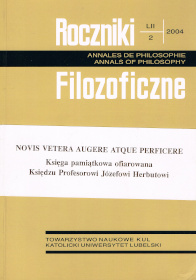Temptations and Sins of Pragmatic Faith – Immanuel Kant on the Internal Lie
Abstract
The paper an analytical-interpretative commentary on several excerpts from I. Kant. The first one with an example of a doctor who thinks he knows his patient's illness deals with the concept of pragmatic faith. The author seeks to explicate this concept by giving three interpretations of Kantian example. In a further part of the paper the internal lie is defined as a sin which may fall part of any „believers not careful enough” of the titular faith. The first example is this sin is an internal profession of faith in God („just in case”) without actual participation in it. The second example is a false worship to the Creator, the one that is motivated by fear or punishment. When interpreting these examples, the author refers to the Kantian distinction between homo noumenon (moral being) and homo phaenomenon (physical being). This distinction is related to the interdiction of using homo phaenomenon only as a means (an instrument to speak).
Copyright (c) 2004 Roczniki Filozoficzne

This work is licensed under a Creative Commons Attribution-NonCommercial-NoDerivatives 4.0 International License.





